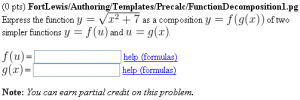FunctionDecomposition1: Difference between revisions
Paultpearson (talk | contribs) No edit summary |
(add historical tag and give links to newer problems.) |
||
| (4 intermediate revisions by 3 users not shown) | |||
| Line 1: | Line 1: | ||
{{historical}} | |||
<p style="font-size: 120%;font-weight:bold">This problem has been replaced with [https://openwebwork.github.io/pg-docs/sample-problems/Algebra/FunctionDecomposition.html a newer version of this problem]</p> | |||
<h2>Function Decomposition</h2> | <h2>Function Decomposition</h2> | ||
| Line 6: | Line 11: | ||
</p> | </p> | ||
* File location in OPL: [https://github.com/openwebwork/webwork-open-problem-library/blob/master/OpenProblemLibrary/FortLewis/Authoring/Templates/Precalc/FunctionDecomposition1.pg FortLewis/Authoring/Templates/Precalc/FunctionDecomposition1.pg] | * File location in OPL: [https://github.com/openwebwork/webwork-open-problem-library/blob/master/OpenProblemLibrary/FortLewis/Authoring/Templates/Precalc/FunctionDecomposition1.pg FortLewis/Authoring/Templates/Precalc/FunctionDecomposition1.pg] | ||
* PGML location in OPL: [https://github.com/openwebwork/webwork-open-problem-library/blob/master/OpenProblemLibrary/FortLewis/Authoring/Templates/Precalc/FunctionDecomposition1_PGML.pg FortLewis/Authoring/Templates/Precalc/FunctionDecomposition1_PGML.pg] | |||
| Line 16: | Line 22: | ||
<tr valign="top"> | <tr valign="top"> | ||
<th> PG problem file </th> | <th style="width: 50%"> PG problem file </th> | ||
<th> Explanation </th> | <th> Explanation </th> | ||
</tr> | </tr> | ||
| Line 43: | Line 49: | ||
loadMacros( | loadMacros( | ||
'PGstandard.pl', | |||
'MathObjects.pl', | |||
'answerComposition.pl', | |||
'PGML.pl', | |||
'PGcourse.pl' | |||
); | ); | ||
TEXT(beginproblem()); | TEXT(beginproblem()); | ||
</pre> | </pre> | ||
| Line 87: | Line 93: | ||
<td style="background-color:#ffdddd;border:black 1px dashed;"> | <td style="background-color:#ffdddd;border:black 1px dashed;"> | ||
<pre> | <pre> | ||
BEGIN_PGML | |||
Express the function [` y = \sqrt{ x^2 + [$a] } `] | |||
Express the function | as a composition [` y = f(g(x)) `] of two simpler | ||
as a composition | functions [` y = f(u) `] and [` u = g(x) `]. | ||
functions | |||
+ [` f(u) = `] [_______________] | |||
+ [` g(x) = `] [_______________] | |||
[@ helpLink('formula') @]* | |||
END_PGML | |||
</pre> | </pre> | ||
<td style="background-color:#ffcccc;padding:7px;"> | <td style="background-color:#ffcccc;padding:7px;"> | ||
| Line 121: | Line 124: | ||
<p> | <p> | ||
<b>Answer Evaluation:</b> | <b>Answer Evaluation:</b> | ||
We use the <code>COMPOSITION_ANS()</code> routine to evaluate both answer blanks. It is possible to use the same variable for both answer blanks. See [http://webwork.maa.org/pod/ | We use the <code>COMPOSITION_ANS()</code> routine to evaluate both answer blanks. It is possible to use the same variable for both answer blanks. See [http://webwork.maa.org/pod/pg/macros/answerComposition.html answerComposition.pl] for more options and details. | ||
</p> | </p> | ||
</td> | </td> | ||
| Line 131: | Line 134: | ||
<td style="background-color:#ddddff;border:black 1px dashed;"> | <td style="background-color:#ddddff;border:black 1px dashed;"> | ||
<pre> | <pre> | ||
BEGIN_PGML_SOLUTION | |||
Solution explanation goes here. | Solution explanation goes here. | ||
END_PGML_SOLUTION | |||
ENDDOCUMENT(); | ENDDOCUMENT(); | ||
Latest revision as of 10:04, 18 July 2023
This problem has been replaced with a newer version of this problem
Function Decomposition

This PG code shows how to check student answers that are a composition of functions.
- File location in OPL: FortLewis/Authoring/Templates/Precalc/FunctionDecomposition1.pg
- PGML location in OPL: FortLewis/Authoring/Templates/Precalc/FunctionDecomposition1_PGML.pg
| PG problem file | Explanation |
|---|---|
|
Problem tagging: |
|
DOCUMENT(); loadMacros( 'PGstandard.pl', 'MathObjects.pl', 'answerComposition.pl', 'PGML.pl', 'PGcourse.pl' ); TEXT(beginproblem()); |
Initialization:
We need to include the macros file |
Context("Numeric");
Context()->variables->add(u=>"Real");
$a = random(2,9,1);
$f = Formula("sqrt(u)");
$g = Formula("x^2+$a");
|
Setup: |
BEGIN_PGML
Express the function [` y = \sqrt{ x^2 + [$a] } `]
as a composition [` y = f(g(x)) `] of two simpler
functions [` y = f(u) `] and [` u = g(x) `].
+ [` f(u) = `] [_______________]
+ [` g(x) = `] [_______________]
[@ helpLink('formula') @]*
END_PGML
|
Main Text: |
$showPartialCorrectAnswers = 1; COMPOSITION_ANS( $f, $g, vars=>['u','x'], showVariableHints=>1); |
Answer Evaluation:
We use the |
BEGIN_PGML_SOLUTION Solution explanation goes here. END_PGML_SOLUTION ENDDOCUMENT(); |
Solution: |